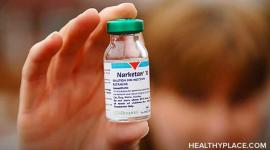Challenges of Bipolar Depression Treatment

The differences between depression (major depressive disorder or unipolar depression) and bipolar depression treatment are related to the mood swings that are part of bipolar disorder. Bipolar depression occurs alongside manic or hypomanic symptoms that can more easily land the person in the hospital.
Treatments that may work for unipolar depression can cause complications for bipolar disorder and depression. Talk therapy for situational depression can be very successful. Unfortunately, the same therapy has less success in severe mood disorders, unless the physiological symptoms of the illness are addressed first. A therapist experienced in treating mood disorders can improve bipolar depression treatment outcomes.
Symptoms that Make Treatment of Bipolar Depression Challenging
Bipolar depression treatment may be complicated by intense anxiety symptoms:
- Racing, worried thoughts
- Trouble breathing, physical agitation
- Fear of going out in public
- Feeling like something is going to go wrong or cause harm
- Feeling like life is spinning out of control
- Obsessive worries over having done something wrong or needing to repeatedly check on something
Psychosis symptoms are more common during bipolar mania but they may still complicate, or appear with, bipolar depression. Examples include:
- Hearing voices
- Seeing things that aren't there
- Belief that objects such as radios or billboards are sending special messages
- Intense physical agitation,
- Seeing yourself getting killed
- Feeling that someone is following you or talking about you (paranoia)
Detailed information on bipolar psychosis.
Rapid cycling also complicates treatment of bipolar depression. More than three mood swings per year is called rapid cycling. Rapid cycling is a very concerning symptom of bipolar disorder and depression and once it's present, it's difficult to treat and often remains for the life of the illness.
Impact of Mania on Bipolar Depression Treatment
Bipolar depression often comes after a manic episode. The bipolar depression that comes after a serious mania can be very intense and often create suicidal thoughts and yet, unless the person understands mania and what happened, they will get help for the depression only. It's critical, though, that bipolar depression treatment take mania into account in order to select effective treatment and not make the manic symptoms worse.
Vigilant monitoring for mania or hypomania is essential with any bipolar depression treatment plan, especially by family members and healthcare professionals. A mixed episode (the presence of depressive and manic symptoms simultaneously; can include psychosis) can create intense treatment difficulties as well. When a mixed episode includes aggression, treatment is even more complicated.
Bipolar Disorder and Depression vs. Unipolar Depression
All bipolar depression treatment must address the above symptoms. Looking for these symptoms can help healthcare professionals make a correct diagnosis between depression and bipolar depression and start appropriate treatment.
If you were a healthcare professional seeing a client with depression for the first time, here are the questions you have to answer in order to determine the correct depression diagnosis:
- Is the depressed person tired all of the time?
- Have they gained unexpected weight?
- Do they have trouble sleeping that doesn't sound like insomnia?
- Have they tried antidepressants without success?
- Does the depression come and go without a specific trigger?
- Has the person experienced mania, even if it's a mild hypomanic day?
- Is there a family history of Bipolar Disorder?
These questions need to be asked of all people who experience depression so that the correct diagnosis is made and the patient can move on to a comprehensive bipolar depression treatment plan.
APA Reference
Fast, J.
(2021, December 28). Challenges of Bipolar Depression Treatment, HealthyPlace. Retrieved
on 2026, March 1 from https://www.healthyplace.com/bipolar-disorder/bipolar-depression/challenges-of-bipolar-depression-treatment



